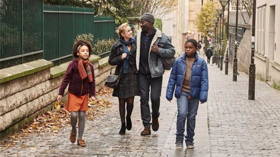BAMcinématek to Present A Retrospective of the Work of Chadian Director Mahamat-Saleh Haroun

From Friday, April 20 through Wednesday, April 25, BAMcinématek presents a retrospective of the work of Chadian director Mahamat-Saleh Haroun. The director's films, which remain mostly overlooked in the US, have won acclaim at both the Venice and Cannes international film festivals. Senior Programmer Ashley Clark explains, "Haroun is, without question, one of Africa's greatest living filmmakers." This retrospective showcases the range of Haroun's work, including his feature and documentary films, displaying, as Clark notes, "his mastery of tone and form."
The retrospective opens with the New York premiere of A Season in France (2017-Apr 20) with Haroun present for a post-screening discussion. With a title that, perhaps, references Rimbaud's A Season in Hell, the film is a deeply felt depiction of the psychological and bureaucratic struggles of two refugee brothers from the war-torn Central African Republic. Though Haroun fled Chad and its ongoing civil war in the 1980s, eventually making his way to Paris where he attended film school and continues to live, his home country is never far from his mind. In an interview with The Guardian he stated, "I may live in France, but my home is in Chad." Pervasive in all of Haroun's films is a sense of quiet dignity, and a determination to depict characters typically unrepresented on the cinematic stage in the course of their daily lives.
In 2010 Haroun's fourth film, A Screaming Man (2010-Apr 21 & 22) won the Jury Prize at the Cannes Film Festival. The film, about the tension between a father and son when the father's job as a hotel pool attendant is given to his son, foregrounds an intimate familial struggle while Chad's civil war lingers in the periphery of the characters' lives. The series also includes Haroun's first film, Bye Bye AFRICA (1999-Apr 25), which the New York Times described as an "extraordinary, anguished, self-reflexive mediation on the state of African cinema." Bye Bye Africa, the first-ever film made in Chad, is an autobiographical docu-fiction in which the director plays a version of himself struggling to make a film in a country devastated by war and colonialism.
The series also includes Dry Season (2006-Apr 21) a quiet, but intense story of revenge and forgiveness about a teenage boy who sets out to kill the man who murdered his father, only to find himself taken under the wing of the man he sought to kill; Abouna (2002-Apr 23), a coming of age story that blends dreamily beautiful images of the Chadian landscape with a story of two brothers abandoned by both of their parents; and Grigris (2013-Apr 22), which screened in competition at Cannes, a thriller about a kind-natured photographer's assistant who becomes involved in the criminal underworld in urban Chad.
The series includes two documentaries: Hissein Habré, A Chadian Tragedy (2016-Apr 22), which examines the brutal reign of the Chadian dictator, Hissène Habré through stories told by survivors of the Habré regime; and Sotigui Kouyaté, A Modern Griot (1995-Apr 23), about the renowned griot (a storyteller who holds a place of honor in West African society). A Modern Griot follows Kouyaté from France to Mali for an emotional homecoming.
Comments

Videos
